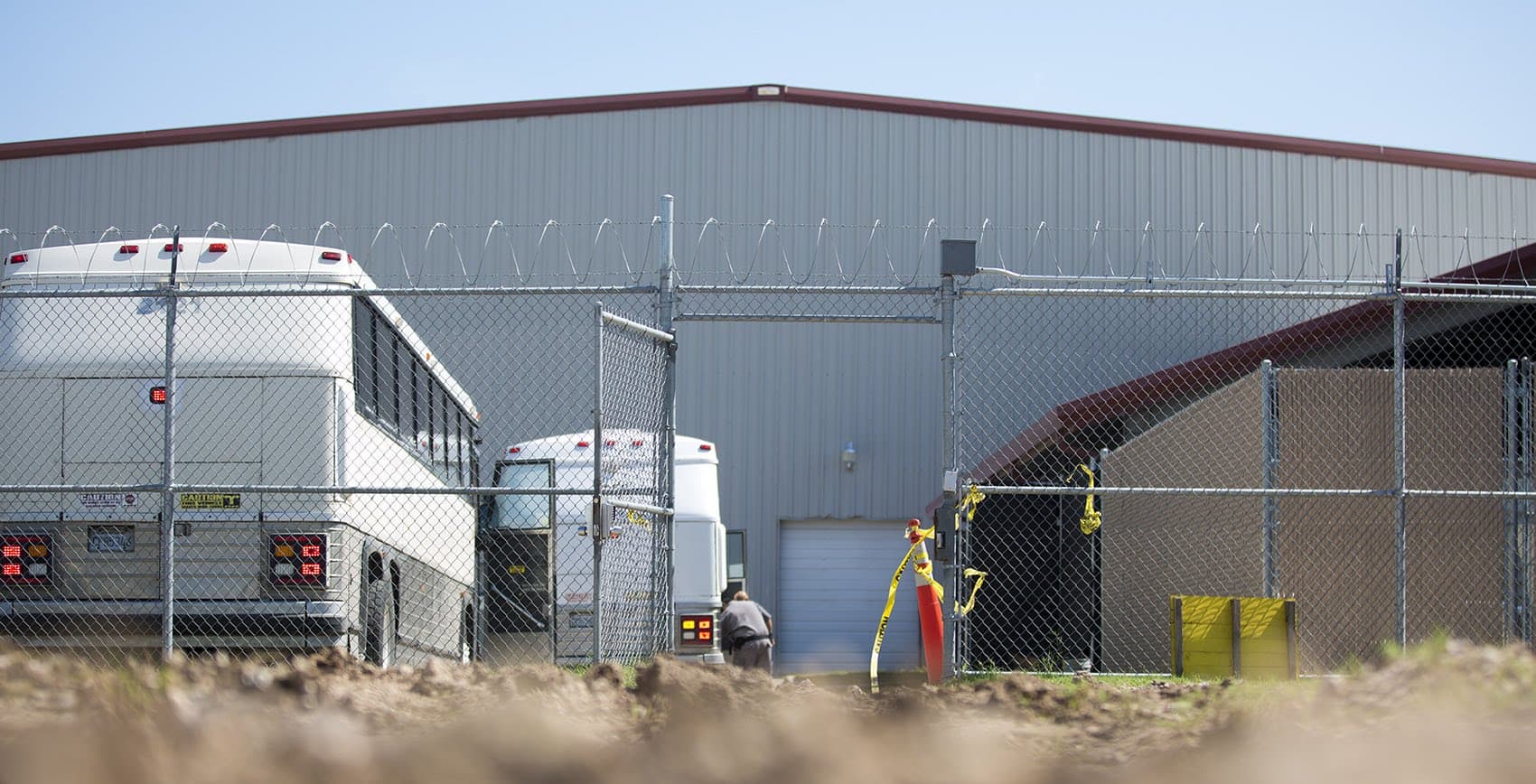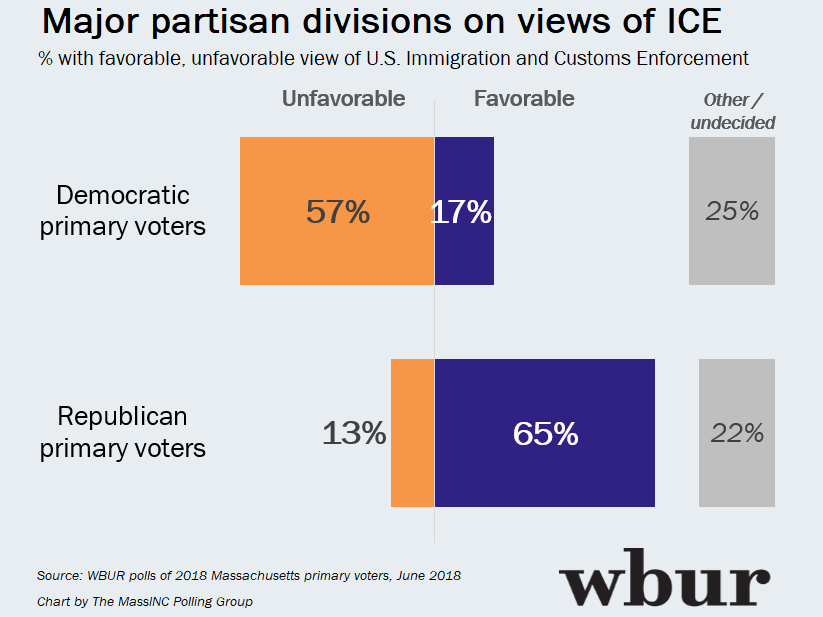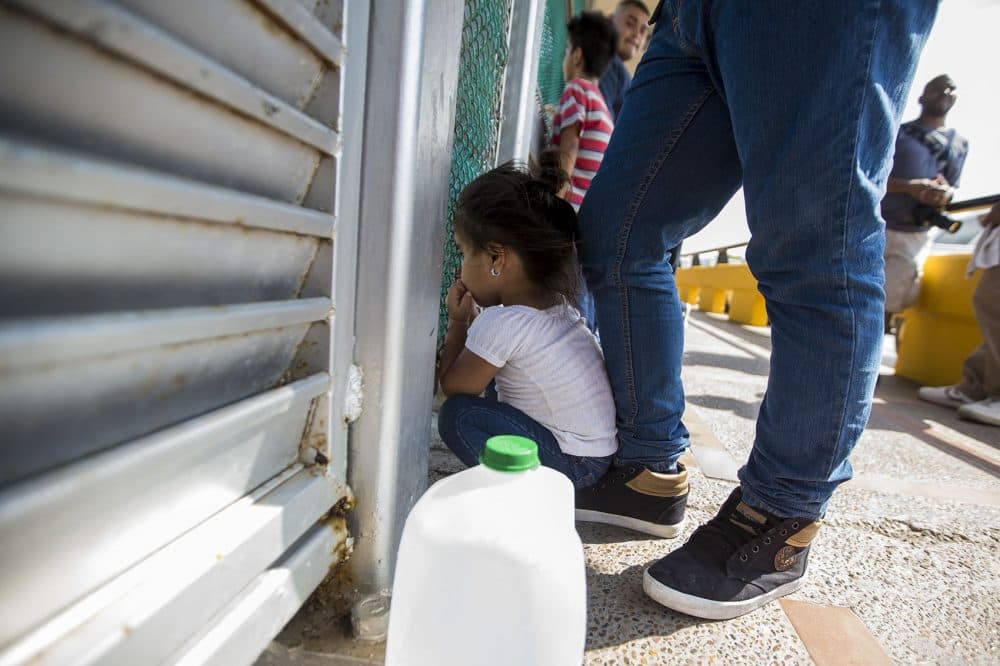Advertisement
Trump’s Immigration Policies Divide Mass. Voters, WBUR Poll Finds

The national debate over President Trump's hard-line immigration policies is deeply divisive in Massachusetts, according to a new WBUR poll of about 800 likely primary voters.
The survey found 92 percent of likely Democratic primary voters (topline results, crosstabs) opposed Trump’s policy of separating families at the border, which the president ended last week through executive action. A little more than half of Republican primary voters (topline results, crosstabs) feel the same way, while 37 percent of likely GOP voters found the policy acceptable.
"So there is a distance between the two parties," according to Steve Koczela, president of the MassINC Polling Group, which conducted the WBUR survey. "Even so, you see a majority on both sides saying the policy was unacceptable."
The poll found a much more striking difference between how Democratic and Republican primary voters view Immigration and Customs Enforcement, or ICE.
Two-thirds of Republican voters have a favorable view of the agency, while close to 60 percent of Democrats view ICE negatively.

So it’s no surprise that some Democrats are taking aim at the agency responsible for enforcing the nation’s immigration laws. Among them is Boston City Councilor Ayanna Pressley, who is running for Congress in the 7th district, and who supports a call from a small group of Democrats in Congress to defund the agency.
"One thing we might look at is abolishing ICE,” Pressley said at a campaign event Tuesday in Everett, “and then establishing a commission that would make recommendations on how to make comprehensive immigration reform that is also compassionate, [while] considering our national security — and not separating families."
Pressley spoke as her Democratic rival, U.S. Rep. Michael Capuano, returned from the U.S.-Mexico border in Texas, where he was touring immigrant detention centers.
While in Texas, Capuano criticized Trump's immigration policy -- just a few days after the president signed an executive order to end the practice of separating families. "I'm not confident about anything having to do with this administration,” Capuano said. “An administration that could do this in the first place should be suspect at every level. This is the same guy who for a week said that they couldn't change the policy by executive order and then went ahead and did it."
Advertisement

That Democrats like Capuano and Pressley are spending so much time talking about immigration is evidence that Trump is setting the agenda, as he appeals to his Republican base. The WBUR poll found evidence of that when it asked likely primary voters what issues they consider most important in the U.S. Senate race.
"We found among Republican primary voters that ending illegal immigration was among the highest of those priorities," said pollster Koczela.
Almost three-quarters of Republicans call ending illegal immigration a top priority in the Senate race — right up there with reducing the federal deficit, standing up for the middle class, strengthening the military, and working with Trump.
Cracking down on what he sees as abuse of the immigration system is a top priority for state Rep. Geoff Diehl, who is challenging U.S. Sen. Elizabeth Warren.
"Securing our border, that's important," Diehl said at a recent fundraiser in Waltham. "We've got to make sure that we don't continue on this path with sanctuary cities. They basically become a harbor for those who are here illegally [and who] commit crimes after they're here. Those people should be deported, and I agree with the president on that, as well. We've got to build that wall."
The WBUR poll found that Diehl is the choice of about a quarter of likely GOP primary voters. The Whitman Republican is running ahead of Beth Lindstrom, who polls at 15 percent, and John Kingston at 12 percent. Like Diehl, Lindstrom and Kingston both say border security is a priority, and the WBUR poll found this primary remains wide open, with close to half of Republican voters still undecided.
Not surprisingly in this very blue state, likely Democratic primary voters have a much different view.
Almost 80 percent of them have a favorable view of Warren. The poll found that among these Democrats, Warren is the most popular politician in the state, followed by Republican Gov. Charlie Baker. Warren, too, has been focusing on immigration, traveling to the border, and speaking out against Trump's policies.
"Trump may think he's playing a political game here,” Warren said recently on MSNBC. "But ultimately, this hits deep where America lives, not just Democrat America or Republican America, [but] independent [Americans] who say, ‘This is not what America does. We do not put small children in cages.’ "
While Trump continues to make immigration his top issue, Democratic primary voters feel differently. The WBUR poll found 28 percent of them say ending illegal immigration should be a major priority for their U.S. senator. Instead, their top issues include strengthening alliances with other countries, raising taxes on the wealthy, and -- agreeing with Republicans — standing up for the middle class.
However, those issues are being buried by Trump's agenda, especially his focus on immigration, which is part of a national strategy to excite Republican primary voters. But pollster Koczela says it could backfire in November among more moderate Republicans and independents.
"The question really is," he said, "as we move into a general election season, [do] these and many other things that Trump does drive enough [moderate voters] away, and back into Democratic arms [so] that it ends up helping the Democrats?"
Koczela says with control of Congress at stake, that's the million-dollar question as we move toward November.
The live telephone survey, conducted Friday to Monday, polled 418 likely Democratic primary voters and 399 likely Republican primary voters. Both subsets have a margin of error of 4.9 percentage points.
This segment aired on June 28, 2018.
